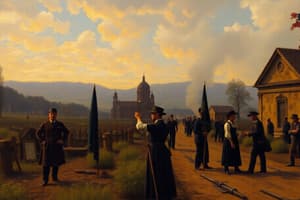Podcast
Questions and Answers
What was the significance of the 1st Battle of the Marne?
What was the significance of the 1st Battle of the Marne?
- It resulted in a major breakthrough for the Germans.
- It marked the end of trench warfare.
- It was the first significant Allied victory of World War 1. (correct)
- It was fought solely in Belgium.
What was the Western Front?
What was the Western Front?
A series of trenches running 700 kilometers from Belgium coast to the Swiss border.
Poison gas was a highly effective weapon that resulted in many deaths during World War 1.
Poison gas was a highly effective weapon that resulted in many deaths during World War 1.
True (A)
What is trench warfare?
What is trench warfare?
What does total war mean?
What does total war mean?
What significant event occurred during the Battle of Verdun?
What significant event occurred during the Battle of Verdun?
What was the outcome of the Battle of the Somme?
What was the outcome of the Battle of the Somme?
When did the Third Battle of Ypres take place?
When did the Third Battle of Ypres take place?
What was the significance of the Gallipoli Campaign?
What was the significance of the Gallipoli Campaign?
The Lusitania sank due to a German torpedo attack.
The Lusitania sank due to a German torpedo attack.
Who was Woodrow Wilson?
Who was Woodrow Wilson?
German submarines used during World War 1 were called ___
German submarines used during World War 1 were called ___
What was the Zimmermann Note?
What was the Zimmermann Note?
What were the reasons for U.S. entry into World War 1?
What were the reasons for U.S. entry into World War 1?
What was the significance of the Second Battle of the Marne?
What was the significance of the Second Battle of the Marne?
What is an armistice?
What is an armistice?
What were the Fourteen Points?
What were the Fourteen Points?
What symbolized the end of World War 1?
What symbolized the end of World War 1?
What did the League of Nations aim to achieve?
What did the League of Nations aim to achieve?
What are mandates in the context of World War 1?
What are mandates in the context of World War 1?
What was the purpose of the Balfour Declaration?
What was the purpose of the Balfour Declaration?
Flashcards are hidden until you start studying
Study Notes
1st Battle of the Marne
- Occurred from September 5 to September 12, 1914.
- Marked the first significant Allied victory in World War 1.
Western Front
- Comprised trenches stretching 700 kilometers from Belgium to the Swiss border.
- The primary location for numerous battles throughout World War 1.
Poison Gas
- Chlorine gas caused severe lung damage, violent coughing, choking, and potential death.
- Introduced as a new weapon in World War 1 to break the deadlock of trench warfare.
Trench Warfare
- Involved fighting from defensive trenches, extensively utilized during World War 1.
- Characterized by miserable conditions for soldiers and high fatalities in the area known as "no-man's land."
Total War
- Defined as the mobilization of all societal resources for warfare.
- Led to increased government control over civilian life.
Battle of Verdun
- Aimed at inflicting maximum casualties on French forces, commenced in February 1916 and ended in December 1916.
- Resulted in approximately 400,000 casualties for France and similar losses for Germany.
Battle of the Somme
- Took place in June to December 1916 around the Somme River in France.
- Intended to relieve pressure from Verdun; resulted in nearly 60,000 British casualties with no significant breakthrough.
Third Battle of Ypres
- Took place in July 1917 in Ypres, Belgium, and ended in November 1917.
- British offensive resulted in minimal changes to front lines after three years of fighting.
Gallipoli Campaign
- Launched in Spring 1915 to seize control of the Dardanelle from the Ottoman Empire.
- Resulted in nearly 200,000 casualties and ultimately ended in failure for the Allies.
Armenian Massacre
- Involved the forced relocation of nearly 2 million ethnic Armenians during World War 1.
- Many were starved or killed during the process under Ottoman military actions.
Lusitania
- A passenger liner with approximately 2,000 civilians sank within 18 minutes after being torpedoed by a German submarine.
- The incident heightened American anger and contributed to U.S. entry into World War 1.
Woodrow Wilson
- Served as the American president during World War 1.
- Initially sought to keep the U.S. neutral before eventual involvement in the conflict.
U-Boats
- German submarines used to disrupt allied shipping and naval operations.
- Created significant hazards for nations trying to transport supplies across the sea.
Zimmermann Note
- A secret proposal from German diplomat Arthur Zimmermann to Mexico.
- Suggested Mexico attack the U.S. in exchange for support and territorial gains.
U.S. Entry to the War
- The U.S. entered World War 1 in 1917 due to German attacks on neutral American ships and changing public sentiment.
- American patience with Germany significantly diminished before entering the conflict.
Second Battle of the Marne
- Occurred near the Marne River in France; marked as the last major German offensive.
- Resulted in an Allied victory, helping to turn the tide of the war.
Armistice
- Also referred to as a truce.
- Sought by German leaders to cease hostilities and negotiate peace.
Fourteen Points
- A peace proposal presented by Woodrow Wilson post-war.
- Sparked discussions among nations regarding potential treaties and peace agreements.
Treaty of Versailles
- Signed at the Palace of Versailles, symbolizing the official end of World War 1.
- Established terms for peace among the involved nations.
League of Nations
- Founded as part of the Treaty of Versailles, based on Wilson's vision for global governance.
- Aimed to promote international cooperation and maintain world peace.
Mandates
- Territories awarded to European powers for administration post-war.
- France took control of Syria and Lebanon; Britain governed Palestine and Iraq.
Balfour Declaration
- Supported the establishment of a Jewish state in Palestine.
- Provided a framework for increased autonomy for populations under mandate control.
Studying That Suits You
Use AI to generate personalized quizzes and flashcards to suit your learning preferences.




